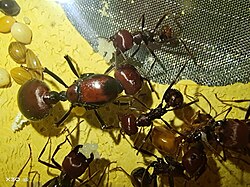Kenyan court fines four men for queen ant trafficking

Thursday, May 8, 2025

Image: 爱蚁小白.
On Wednesday, a Kenyan court fined four men USD7,700 each (equivalent to 1 million shillings) for attempting to smuggle about 5,440 giant queen ants to markets in Europe and Asia. If they refused to pay it, they could face a minimum prison sentence of one year. Among the populations were Messor cephalotes, a species of harvester ant native to East Africa.
Ants are actively sought by exotic pet enthusiasts for their complex eusocial behaviour that includes the building of colonies, being typically kept in large specialized devices known as formicaria. However, the unauthorized possession of any wildlife specimen (including ants) is prohibited in Kenya, and people partaking in these activities may be subject to a fine of up to USD10,000 and at least five years in prison.
The men had been arrested on April 5. Two Belgian teenagers, Lornoy David and Seppe Lodewijckx, 19, were caught at a guest house with about 5,000 queen ants contained in thousands of test tubes in Nakuru County, northwest of Nairobi; when inquired before the court, the teenagers said they acted out of naivety. Separately, a Vietnamese man named Duh Heng Nguyen and Kenyan national Dennis Nganga were found with 400 ants at the country’s capital, in a meeting that senior magistrate Njeri Thuku said was an “elaborate scheme” that bore “the hallmarks of illegal wildlife trade and possibly biopiracy“. They were all charged on April 15 in two related cases.
“This is beyond a hobby”, Thuku said, further comparing their actions to the slave trade: “Imagine being violently removed from your home and packed into a container with many others like you (…) where the only source of nourishment for the foreseeable future is glucose water”. The Belgians’ lawyer Halima Nyakinyua agreed with the sentencing and said they would not appeal.
The Kenya Wildlife Service (KWS) welcomed the ruling, highlighting it as an example of Kenya’s zero-tolerance policy on illegal wildlife trafficking. The agency also stated that the trafficking of ants could deprive the local communities from their putative ecological and economic benefits.
Experts in Kenya said the case represented a broader trend of trafficking smaller and lesser known species.
Sources
- Evelyne Musambi. “Two Belgian teenagers found with 5,000 ants in Kenya given $7,700 fine or 1-year prison sentence” — Los Angeles Times, May 7, 2025
- Akisa Wandera, Wycliffe Muia. “Gang who smuggled thousands of queen ants sentenced in Kenya” — BBC News Online, May 7, 2025
- Hereward Holland, Humphrey Malalo. “Kenya court fines four men for trafficking thousands of queen ants” — Reuters, May 7, 2025
- Agence France-Presse. “Kenya court fines teens for trying to smuggle protected ants” — France 24, May 7, 2025
- Edwin Waita, Monicah Mwangi. “Kenyan agents bust plot to smuggle giant ants for sale to foreign insect lovers” — Reuters, April 15, 2025





